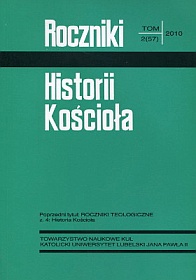Religious Culture of the Diocese of Szczecin-Kamień
Abstract
Preaching the Gospel of Jesus Christ in the Diocese of Szczecin-Kamień Pomorski, established in 1972, was conducted directly using the following methods among others: dispensing the Sacraments, teaching the Word of God or pastoral work; or indirectly by fostering religious culture in the Western Pomeranian region. It would seem that in the latter case the Church should play a crucial role in pastoral care, but the reality turned out to be different. Both internal circumstances of the diocesan church and outside factors caused religious culture on the Oder and the Baltic Sea to develop somewhat too slowly. That, however, did not discourage the clergy and faithful from taking initiatives to spread Christian values and those compatible with Christianity. For twenty years, the following institutions were created in the diocese: a museum in Kamień Pomorski, the Diocesan Museum, College of Religious Studies, a seminary library, “St. Brother Albert Club”, Szczecin Catholic Club; also, cultural-science events took place, such as International Festival of Organ and Chamber Music in Kamień Pomorski, Christian Culture Days; or religious songs were written, which became staple of the cultural life of Western Pomerania. Among those who promoted religious culture in the diocese were: Fr Roman Kostynowicz, Fr Jan Marcin Mazur as well as Jan and Joanna Kulma. Being a symbol of hope and freedom in the years of ideological slavery, the Church was a symbol of hope, “oasis of freedom” and a breeding ground of “free man”.
Copyright (c) 2010 Roczniki Historii Kościoła

This work is licensed under a Creative Commons Attribution-NonCommercial-NoDerivatives 4.0 International License.

